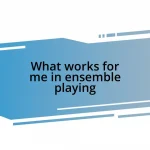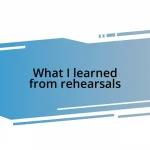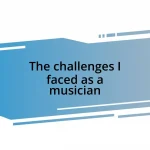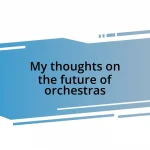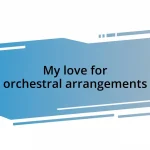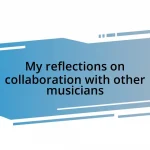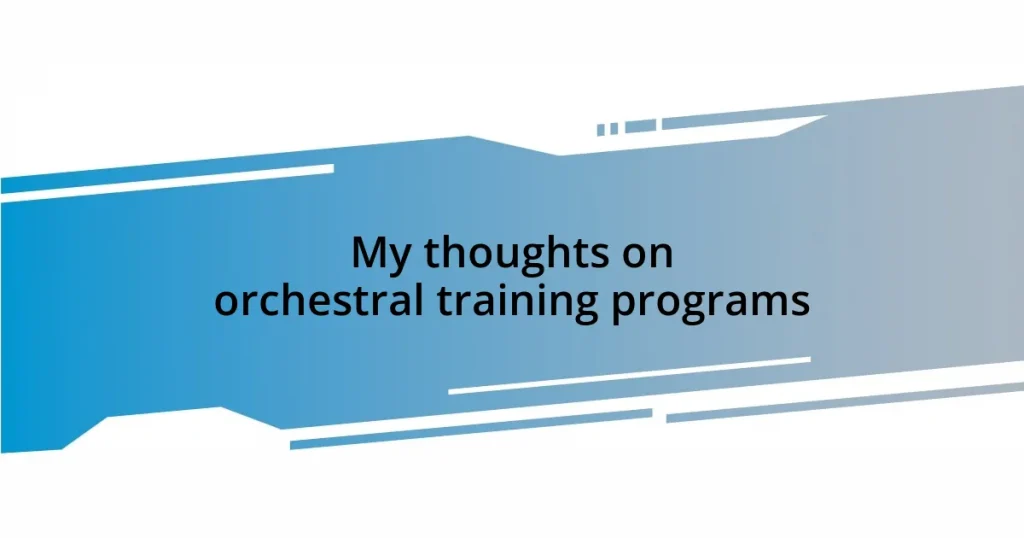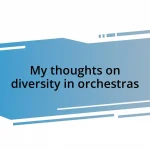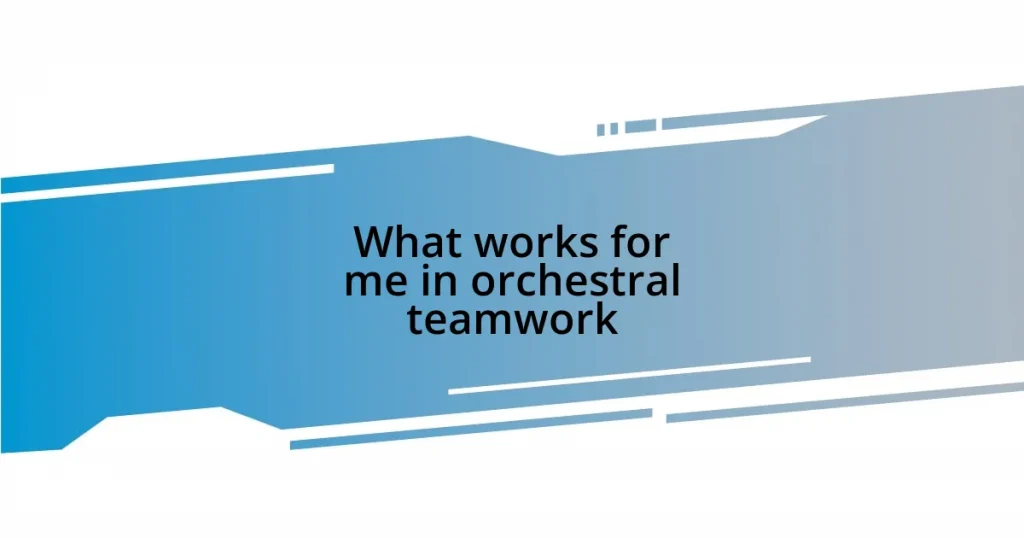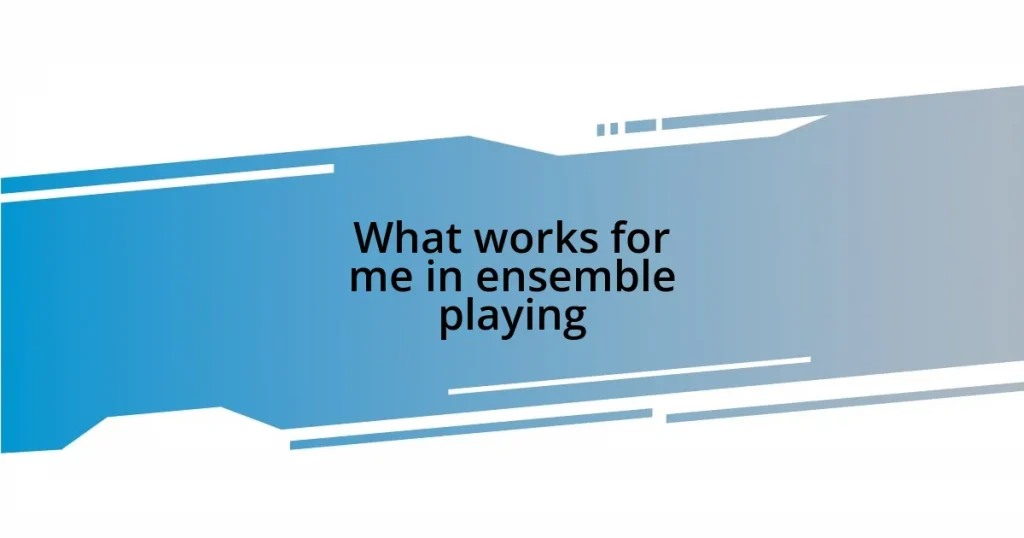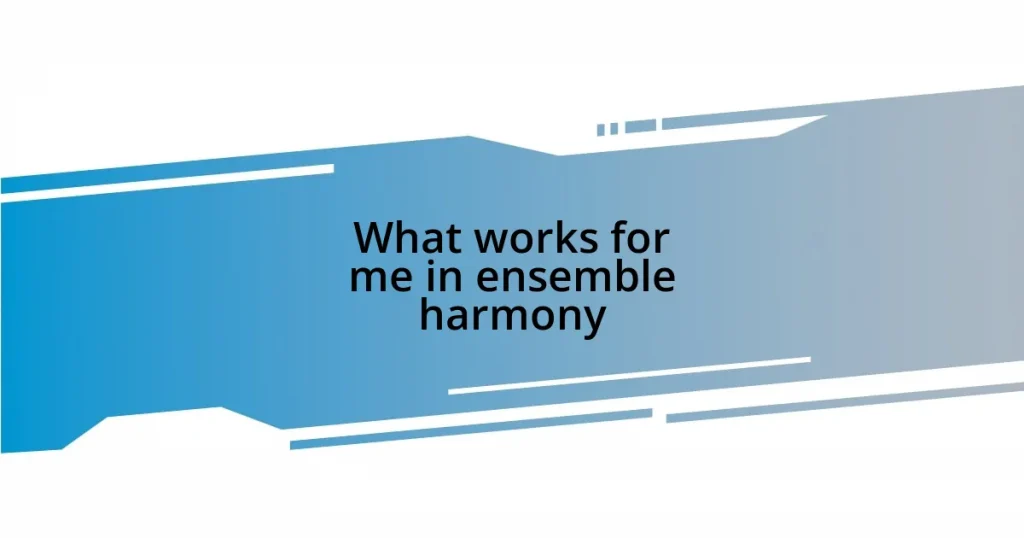Key takeaways:
- Orchestral training programs blend technical skill with artistic expression, emphasizing collaboration and active listening among ensemble members.
- Key components of effective programs include experienced mentorship, peer collaboration, performance opportunities, and exposure to diverse musical styles.
- Future trends in orchestral education involve technology integration, collaborations with community groups, and a focus on mental health and well-being for musicians.
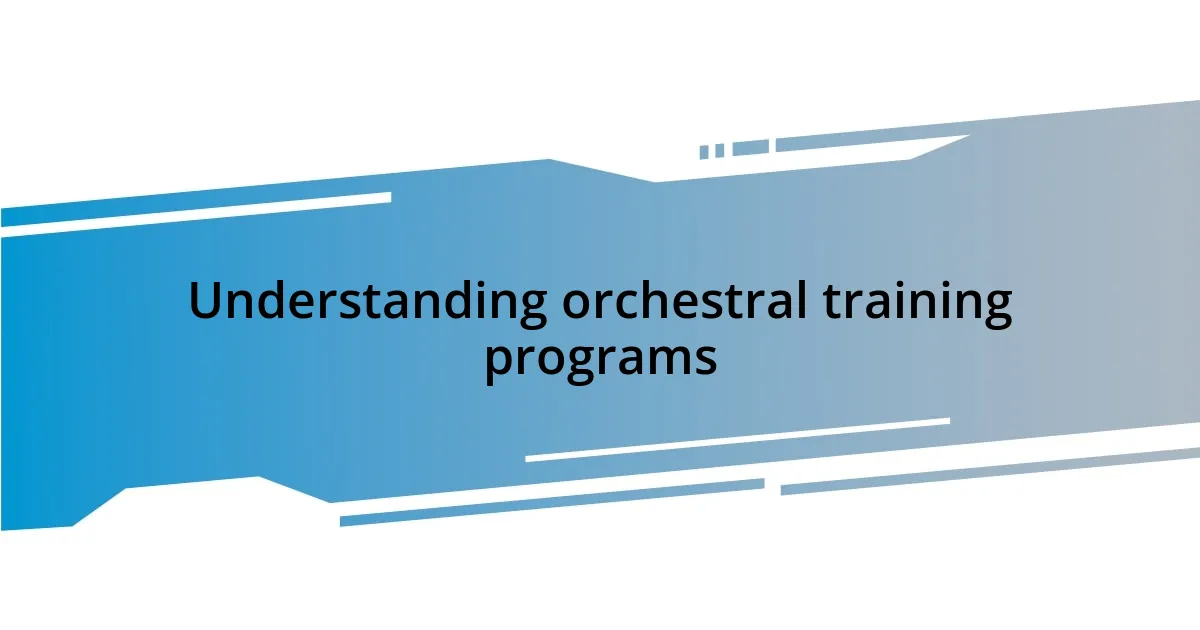
Understanding orchestral training programs
When I first learned about orchestral training programs, I was struck by how they blend technical skill with artistic expression. These programs are designed not just to teach musicians how to play their instruments but to foster collaboration and communication within an ensemble. Isn’t it fascinating how something that seems so structured allows for so much individual creativity?
I remember sitting in on a rehearsal with a youth orchestra, feeling the palpable energy in the room as musicians navigated their parts together. It was a crash course in teamwork; each player, while focusing on their own notes, also kept an ear out for how their sound blended with others. This kind of environment is a hallmark of effective orchestral training programs—they encourage students to listen actively and respond intuitively.
Additionally, these programs often emphasize the importance of discipline and dedication. I’ve witnessed aspiring musicians push through frustration and fatigue, only to emerge with a profound sense of achievement when they finally perfect a challenging piece. It begs the question: how often do we encounter experiences that teach us resilience through the beauty of music? Each note played in harmony can be a transformative moment, providing insights that extend far beyond the stage.
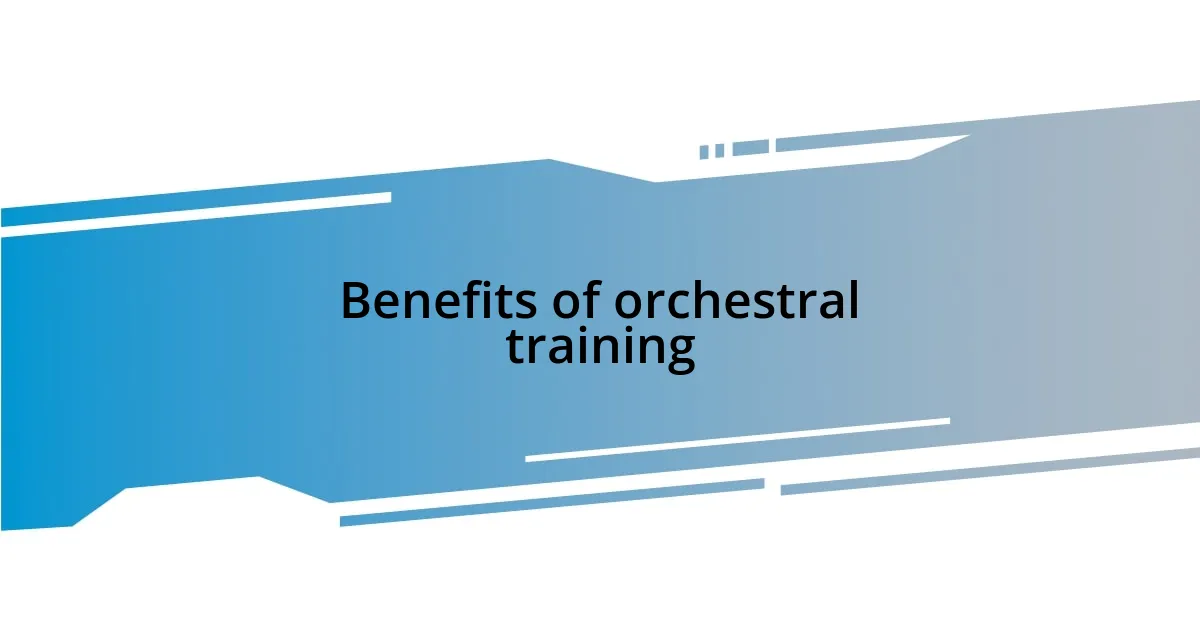
Benefits of orchestral training
The benefits of orchestral training extend beyond mere musicality. Personally, I’ve found that playing in an orchestra sharpens one’s listening skills profoundly. It’s amazing how I could be so focused on my own part, while simultaneously enhancing my ability to hear every other instrument. This heightened awareness translates to better communication skills in everyday life—after all, isn’t effective listening key to understanding others?
Moreover, orchestral training cultivates a deep sense of community. I vividly recall the bonds I formed with my fellow musicians during long rehearsals, united by a shared passion for music. Those moments, filled with laughter and shared challenges, taught me the value of collaboration. It’s heartening to realize that, as musicians, we not only work together towards a common goal but also create lasting friendships along the way.
Another notable benefit is the development of discipline and time management. In my experience, the rigor of preparing for concerts instills a work ethic that is hard to replicate elsewhere. Balancing practice schedules with personal commitments pushed me to prioritize my time effectively. This, I believe, is a vital life skill that the structured environment of an orchestra teaches beautifully.
| Benefit | Personal Experience |
|---|---|
| Listening Skills | Enhanced awareness of others’ parts led to better communication. |
| Community | Bonds formed during rehearsals created lasting friendships. |
| Discipline | Structured practice instilled a strong work ethic and time management skills. |
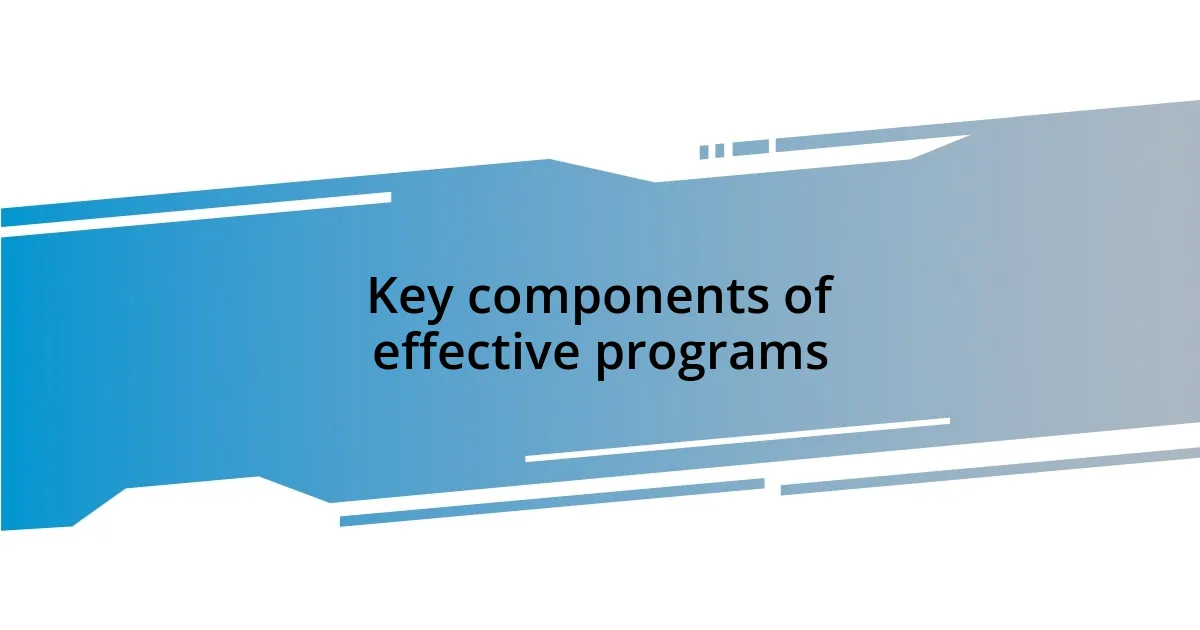
Key components of effective programs
Effective orchestral training programs have distinct components that elevate the educational experience for musicians. From my observations, one of the most crucial elements is the mentor-mentee relationship. Great instructors not only teach technique but also nurture the emotional and artistic growth of their students. I still remember a particular workshop where our conductor shared stories about personal challenges he faced as a musician. His vulnerability resonated deeply with me, creating a bond that inspired me to push my limits.
Here’s a concise list of key components that I believe make orchestral training programs effective:
- Experienced Mentorship: Guidance from accomplished musicians who share both technical skills and personal stories.
- Peer Collaboration: Opportunities for musicians to work closely with each other, fostering teamwork and mutual respect.
- Performance Opportunities: Regular concerts that allow students to apply what they’ve learned in a practical setting.
- Feedback Mechanisms: Constructive critique sessions to help students grow and refine their abilities.
- Diverse Repertoire: Exposure to various musical styles that broaden a musician’s horizons and deepen their understanding of music.
Another essential aspect is the inclusion of real-world performance experiences. In my early days, the rush before stepping on stage was simultaneously exhilarating and nerve-wracking. I recall one performance where we played a challenging symphony; the collective effort and adrenaline flowing through the ensemble created an electric atmosphere. The way we had to adapt and respond to each other in real time was a crucial lesson in connection and communication. These experiences prepare musicians not just for concerts, but for the unpredictability of life as well.
By focusing on these components, orchestral training programs can create an environment that not only hones musical abilities but also fosters personal growth.
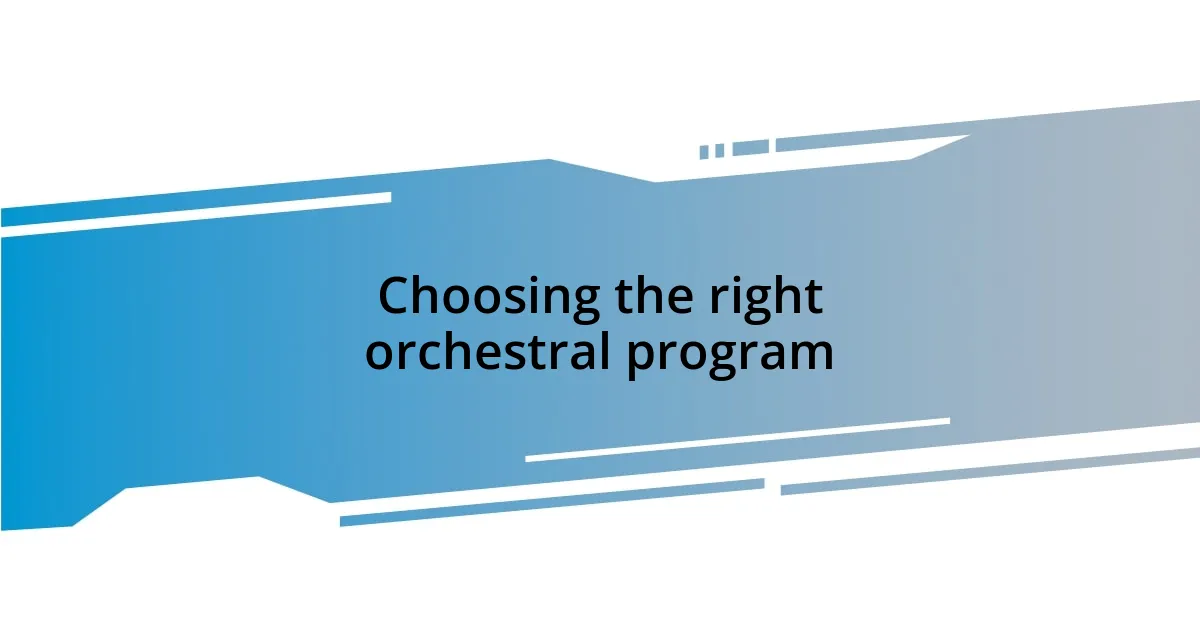
Choosing the right orchestral program
Choosing the right orchestral program is crucial for fostering both musical skills and personal development. When I was selecting a program, I took a close look at the instructors. Were they seasoned professionals? Did they have a history of nurturing young talent? I found that teachers who shared their own musical journeys—as well as the bumps along the way—made me feel seen and understood. Their stories not only motivated me but also reassured me that challenges are a natural part of growth.
As I navigated my options, I also paid attention to the level of collaboration among students. A program that encourages ensemble work, where every voice is valued, can dramatically enhance one’s experience. I remember a time when my peers and I crafted our own arrangement for an upcoming concert; the fun we had brainstorming and negotiating parts taught me about compromise and trust. Have you ever felt that rush of excitement when you collaborate with others? It’s a different kind of learning that obliterates boundaries and cultivates lasting friendships.
Finally, consider the performance opportunities offered by the program. These experiences can be transformative. I still vividly recall the first time I stepped into the spotlight after months of practice. My heart raced as the lights dimmed, but the moment I began to play, everything else fell away. The energy of sharing music with an audience is indescribable and fueled my passion to improve. Are you ready to embrace that thrill, and perhaps even those butterflies, as part of your orchestral journey? Choosing a program that emphasizes live performance is essential in preparing you for both the stage and life beyond it.
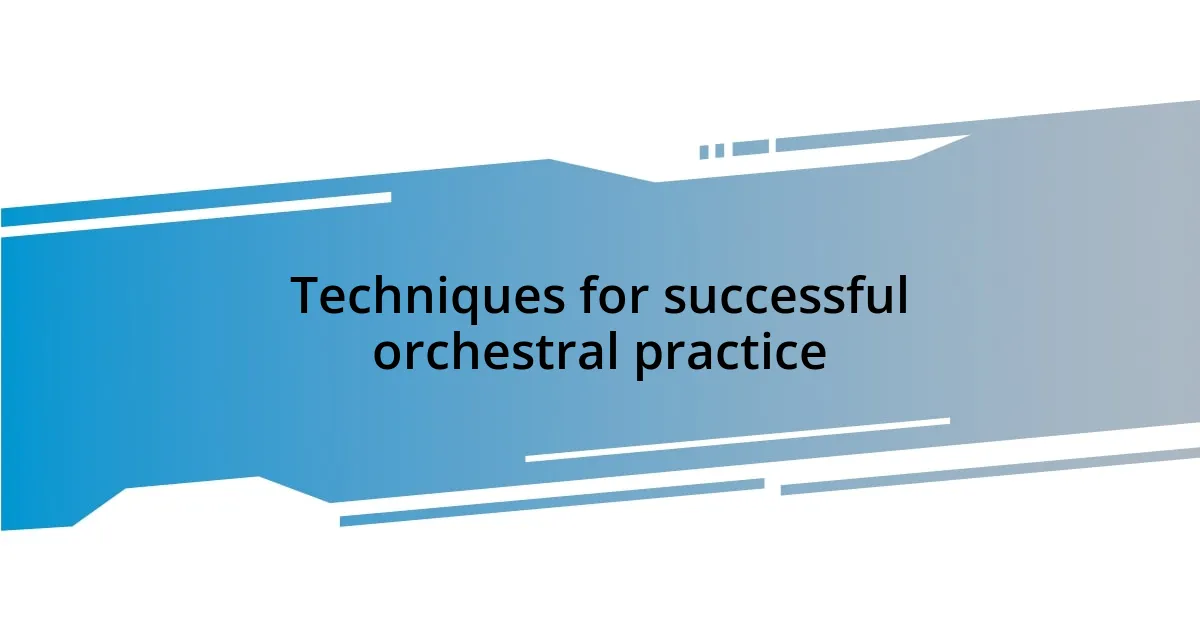
Techniques for successful orchestral practice
When I practice with my orchestra, I find that visualization plays a powerful role. Imagining the sound we aspire to achieve helps me focus on each note’s emotional impact. I recall a rehearsal where I closed my eyes and envisioned the audience enveloped in our music. That mental image pushed me to dig deeper into the nuances of my playing. Have you ever tried visualizing your performance like that? It can shift your entire perspective on practice.
Another technique I cherish is setting specific, achievable goals for each session. Instead of broad objectives like “get better at this piece,” I break it down into bite-sized tasks. I used to struggle with tricky passages, but now I focus on just a few measures at a time. This gradual approach transforms frustration into success, where the thrill of nailing a section brings a sense of accomplishment. I wonder if you’ve experienced the satisfaction of conquering a challenging phrase—there’s nothing quite like it!
Additionally, incorporating recordings of my rehearsals has been enlightening. Listening back allows me to identify areas for improvement that I might not notice in the moment. The first time I recorded myself, I was surprised by how much more I could hear compared to simply playing. It’s a bit like holding a mirror up to your playing; you see things you might want to change or embrace. Have you considered this practice? Your ears can reveal a world of insight that truly enhances your growth.
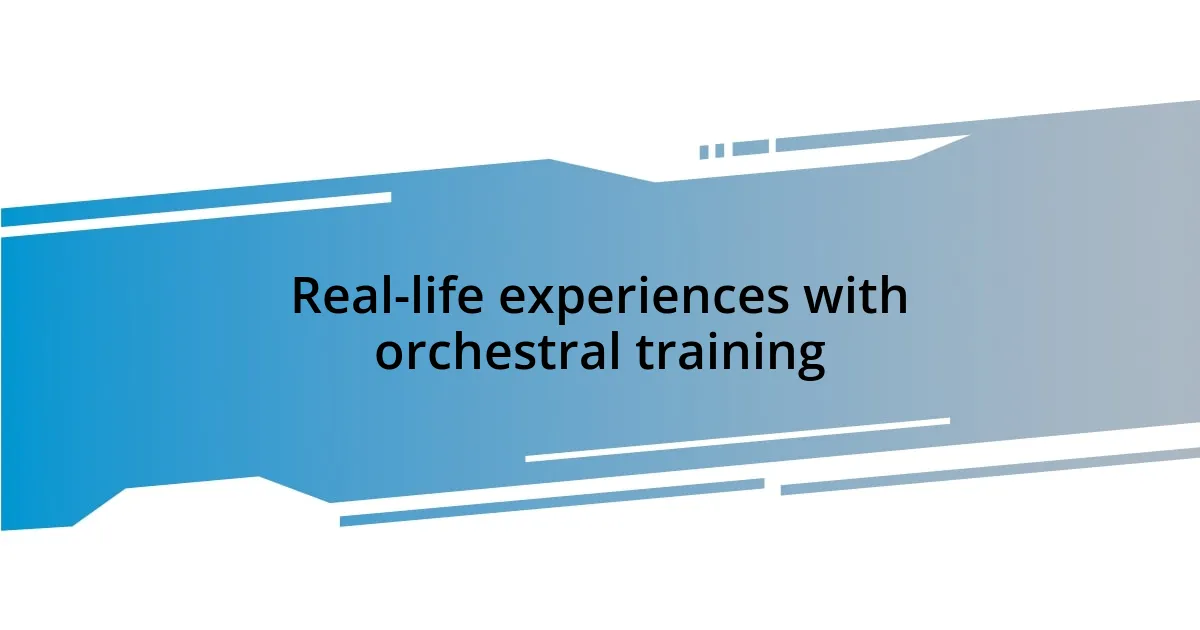
Real-life experiences with orchestral training
The first time I participated in an orchestral training program, I remember feeling a mix of excitement and trepidation. I was surrounded by incredibly talented musicians, and during one of those intense rehearsals, I experienced a moment of pure synergy. As we played together, I could feel each player’s energy—it was like our individual sounds melded to create something larger than ourselves. Have you ever felt that connection with other musicians? Those moments made me realize just how powerful collective artistry can be.
Another unforgettable experience happened during a mentorship session. A seasoned conductor took time to share his insights with us about interpreting music. He played a passage and then asked each of us how we would approach it differently. Listening to my peers’ interpretations sparked a fire in me; I felt emboldened to explore my own unique voice. Have you ever found your inspiration in someone else’s perspective? I learned that every musician brings their individuality to a piece, enriching the orchestra’s overall sound.
Most challenging, perhaps, was the time when I faced a performance setback. I had practiced diligently, but nerves took over at a pivotal moment, and I stumbled. Walking off stage emotionally drained, I questioned if I’d ever recover from it. Yet, in reflecting on the experience, I recognized that mistakes are simply stepping stones. It’s in those moments of vulnerability that we grow. Can you recall a time when a setback turned into a teaching moment for you? It’s often those challenges that lead to the most profound personal and musical growth.

Future trends in orchestral education
There’s a noticeable shift toward technology integration in orchestral education. I recently attended a workshop that showcased virtual reality (VR) experiences designed for musicians. It was fascinating to see how VR can immerse students in interactive environments, allowing them to not only visualize their roles within an orchestra but also practice in simulated settings. Have you ever imagined what it would be like to rehearse in a grand concert hall from the comfort of your home? It’s this kind of innovation that could redefine how we approach orchestral learning.
Collaboration among institutions is also becoming increasingly prominent. I’ve seen programs partner with local community groups to engage a wider audience and foster a more inclusive atmosphere. This connectivity not only allows students to perform for diverse audiences but also enriches their understanding of music’s cultural impact. Have you ever realized how different contexts can change your interpretation of a piece? Being exposed to a variety of musical styles and audiences can deeply influence our growth as musicians.
Lastly, the focus on mental health and well-being is gaining traction in orchestral training. In my experience, learning to manage performance anxiety has been just as crucial as honing technical skills. During a recent seminar, we discussed strategies for mental resilience, including mindfulness practices and positive affirmations. Have you ever found that taking a moment to breathe can enhance your focus before a performance? Prioritizing mental health within orchestral education not only prepares us for the stage but also nurtures our passion for music.


